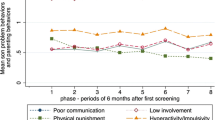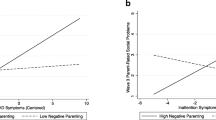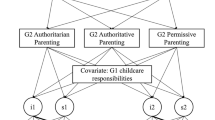Abstract
In the current study, we examined longitudinal changes in, and bidirectional effects between, parenting practices and child behavior problems in the context of a psychosocial treatment and 3-year follow-up period. The sample comprised 139 parent–child dyads (child ages 6–11) who participated in a modular treatment protocol for early-onset ODD or CD. Parenting practices and child behavior problems were assessed at six time-points using multiple measures and multiple reporters. The data were analyzed using cross-lagged panel analyses. Results indicated robust temporal stabilities of parenting practices and child behavior problems, in the context of treatment-related improvements, but bidirectional effects between parenting practices and child behavior were less frequently detected. Our findings suggest that bidirectional effects are relatively smaller than the temporal stability of each construct for school-age children with ODD/CD and their parents, following a multi-modal clinical intervention that is directed at both parents and children. Implications for treatment and intervention are discussed.

Similar content being viewed by others
Notes
Sample size prevented analyses with child sex as a covariate or moderator. However, exploratory cross-lagged analyses with the subsample of males (n = 118) were very similar in terms of longitudinal stability and cross-domain paths. Details of these analyses are available from the authors.
References
Achenbach, T. M. (1991). Integrative guide for the 1991 CBCL/4–18, YSR, and TRF profiles. Burlington: University of Vermont, Department of Psychiatry.
Albrecht, A. K., Galambos, N. L., & Jansson, S. M. (2007). Adolescents’ internalizing and aggressive behaviors and perceptions of parents’ psychological control: a panel study examining direction of effects. Journal of Youth and Adolescence, 36, 673–684.
Baron, R. M., & Kenny, D. A. (1986). The moderator-mediator variable distinction in social psychological research: conceptual, strategic, and statistical considerations. Journal of Social and Personality Psychology, 51, 1173–1182.
Beauchaine, T. S., Webster-Stratton, C., & Reid, M. J. (2005). Mediators, moderators, and predictors of 1-year outcomes among children treated for early-onset conduct problems: a latent growth curve analysis. Journal of Consulting and Clinical Psychology, 73, 371–388.
Bell, R. Q. (1968). A reinterpretation of the direction of effects in studies of socialization. Psychological Review, 75, 81–95.
Biederman, J., Monuteaux, M. C., Greene, R. W., Braaten, E., Doyle, A. E., & Faraone, S. V. (2001). Long-term stability of the Child Behavior Checklist in a clinical sample of youth with Attention Deficit Hyperactivity Disorder. Journal of Clinical Child Psychology, 30, 492–502.
Burke, J. D., Pardini, D. A., & Loeber, R. (2008). Reciprocal relationships between parenting behavior and disruptive psychopathology from childhood through adolescence. Journal of Abnormal Child Psychology, 36, 679–692. doi:10.1007/s10802-008-9219-7.
Cowan, P. A., & Cowan, C. P. (2006). Developmental psychopathology from family systems and family risk factors perspectives: implications for family research, practice, and policy. In D. Cicchetti & D. J. Cohen (Eds.), Developmental Psychopathology (Theory and Method 2nd ed., Vol. 1, pp. 530–587). Hoboken: Wiley.
DeGarmo, D. S., Patterson, G. R., & Forgatch, M. S. (2004). How do outcomes in a specified parent training intervention maintain or wane over time? Prevention Science, 5, 73–89.
Demidovich, M., Kolko, D. J., Bukstein, O. G., & Hart, J. (2011). Medication refusal in children with Oppositional Defiant Disorder or Conduct Disorder and comorbid Attention-Deficit/Hyperactivity Disorder: medication history and clinical correlates. Journal of Child and Adolescent Psychopharmacology, 21, 57–66. doi:10.1089/cap. 2010.0001.
DeRubeis, S., & Granic, I. (2012). Understanding treatment effectiveness for aggressive youth: the importance of regulation in mother-child interactions. Journal of Family Psychology, 26, 66–75. doi:10.1037/a0026837.
Diamond, G., & Josephson, A. (2005). Family-based treatment research: a 10-year update. Journal of the American Academy of Child and Adolescent Psychiatry, 44, 872–887. doi:10.1097/01.chi.0000169010.96783.4e.
Dishion, T. J., Shaw, D., Connell, A., Gardner, F., Weaver, C., & Wilson, M. (2008). The Family Check-Up with high-risk indigent families: preventing problem behavior by increasing parents’ positive behavior support in early childhood. Child Development, 79, 1395–1414.
Emery, R. E., Binkoff, J. A., Houts, A. C., & Carr, G. R. (1983). Children as independent variables: some clinical implications of child-effects. Behavior Therapy, 14, 398–412.
Fite, P. J., Colder, C. R., Lochman, J. E., & Wells, K. C. (2006). The mutual influence of parenting and boys’ externalizing behavior problems. Applied Developmental Psychology, 27, 151–164.
Forgatch, M. S., & DeGarmo, D. S. (1999). Parenting through change: an effective prevention program for single mothers. Journal of Consulting and Clinical Psychology, 67, 711–724.
Glaser, B. A., Horne, A. M., & Myers, L. L. (1995). A cross-validation of the parent perception inventory. Child and Family Behavior Therapy, 17, 21–34. doi:10.1300/J019v17n01_02.
Granic, I., & Patterson, G. R. (2006). Toward a comprehensive model of antisocial development: a dynamic systems approach. Psychological Review, 113, 101–131. doi:10.1037/0033-295X.113.1.101.
Hazzard, A., Christensen, A., & Margolin, G. (1983). Children’s perceptions of parental behaviors. Journal of Abnormal Child Psychology, 11, 49–59.
Hipwell, A., Keenan, K., Kasza, K., Loeber, R., Stouthamer-Loeber, M., & Bean, T. (2008). Reciprocal influences between girls’ conduct problems and depression, and parental punishment and warmth: a 6 year prospective analysis. Journal of Abnormal Child Psychology, 36, 663–677. doi:10.1007/s10802-007-9206-4.
Hollenstein, T. (2003). State space grids: analyzing dynamics across development. International Journal of Behavioral Development, 31, 384–396. doi:10.1177/0165025407077765.
Huh, D., Tristan, J., Wade, E., & Stice, E. (2006). Does problem behavior elicit poor parenting? A prospective study of adolescent girls. Journal of Adolescent Research, 21, 185–204.
Kazdin, A. E. (2010). Problem-solving skills training and parent management training for oppositional defiant disorder and conduct disorder. In J. R. Weisz & A. E. Kazdin (Eds.), Evidence-based psychotherapies for children and adolescents (2nd ed., pp. 211–226). New York: Guilford.
Kazdin, A. E., & Nock, M. K. (2003). Delineating mechanisms of change in child and adolescent therapy: methodological issues and treatment recommendations. Journal of Child Psychology and Psychiatry, 44, 1116–1129.
Kolko, D. J. (1995). Multimodal partial-day treatment of child antisocial behavior: service description and multi-level program evaluation. Continuum: Developments in Ambulatory Mental Health Care, 2, 3–24.
Kolko, D. J. (1996a). Clinical monitoring of treatment course in child physical abuse: psychometric characteristics and treatment comparisons. Child Abuse & Neglect, 20, 23–43.
Kolko, D. J. (1996b). Individual cognitive-behavioral treatment and family therapy for physically abused children and their offending parents: a comparison of clinical outcomes. Child Maltreatment, 1, 322–342.
Kolko, D. J. (2001). Efficacy of cognitive-behavioral treatment and fire safety education for firesetting children: Initial and follow-up outcomes. Journal of Child Psychology and Psychiatry, and Allied Disciplines, 42, 359–369.
Kolko, D. J., & Swenson, C. C. (2002). Assessing and treating physically abused children and their families: a cognitive-behavioral approach. Thousand Oaks: Sage Publications.
Kolko, D. J., Loar, L. L., & Sturnick, D. (1990). Inpatient social-cognitive skills training groups with conduct disordered and attention deficit disordered children. Journal of Child Psychology and Psychiatry, 31, 737–748.
Kolko, D. J., Dorn, L. D., Bukstein, O. G., Pardini, D., Holden, E. A., & Hart, J. (2009). Community vs. clinic-based modular treatment of children with early-onset ODD or CD: a clinical trial with 3-year follow-up. Journal of Abnormal Child Psychology, 37, 591. doi:10.1007/s10802-009-9303-7.
Kolko, D. J., Iselin, A. M., Gully, K. (2011). Evaluation of the Sustainability and Clinical Outcome of Alternatives for Families: A Cognitive-Behavioral Therapy (AF-CBT) in a Child Protection Center. Child Abuse and Neglect, 35, 105–116. doi:10.1016/j.chiabu.2010.09.004,10.1016/j.chiabu.2010.09.004
Kraemer, H. C., Stice, E., Kazdin, A., Offord, D., & Kupfer, D. (2001). How do risk factors work together? Mediators, moderators, and independent, overlapping, and proxy variables. The American Journal of Psychiatry, 158, 848–856.
Kraemer, H. C., Wilson, G. T., Fairburn, C. G., & Agras, W. S. (2002). Mediators and moderators of treatment effects in randomized clinical trials. Archives of General Psychiatry, 59, 877–883.
Lahey, B. B., Waldman, I. D., & McBurnett, K. (1999). Annotation: the development of antisocial behavior: an integrative causal model. Journal of Child Psychology and Psychiatry, 40, 669–682.
Lansford, J. E., Criss, M. M., Laird, R. D., Shaw, D. S., Pettit, G. S., Bates, J. E., & Dodge, K. A. (2011). Reciprocal relations between parents’ physical discipline and children’s externalizing behavior during middle childhood and adolescence. Development and Psychopathology, 23, 225–238. doi:10.1017/S0954579410000751.
Larson, J., & Lochman, J. E. (2002). Helping school children cope with anger: a cognitive-behavioral intervention. New York: Guilford Press.
Loeber, R., Drinkwater, M., Yin, Y., Anderson, S. J., Schmidt, L. C., & Crawford, A. (2000). Stability of family interaction from ages 6 to 18. Journal of Abnormal Child Psychology, 28, 353–369.
Martinez, C. R., & Forgatch, M. S. (2001). Preventing problems with boys’ noncompliance: effects of a parent training intervention for divorcing mothers. Journal of Consulting and Clinical Psychology, 69, 416–428.
Masten, A. S., & Shaffer, A. (2006). How families matter in child development: reflections from research on risk and resilience. In A. Clarke-Stewart & J. Dunn (Eds.), Families count: effects on child and adolescent development (pp. 5–25). Cambridge: Cambridge University Press.
McLain, D. B., Wolchik, S. A., Winslow, E., Tein, J., Sandler, I. N., & Millsap, R. E. (2010). Developmental cascade effects of the New Beginnings Program on adolescent adaptation outcomes. Development and Psychopathology, 22, 771–784.
McMahon, R. J., & Forehand, R. (2003). Helping the noncompliant child. New York: Guilford Press.
Muthen, L., & Muthen, B. (2010). Mplus User's Guide, 6th edition. Los Angeles, CA: Muthen & Muthen.
Pardini, D. A. (2008). Novel insights into longstanding theories of bidirectional parent–child influences: introduction to the special section. Journal of Abnormal Child Psychology, 36, 627–631.
Pardini, D. A., Fite, P. J., & Burke, J. D. (2008). Bidirectional associations between parenting practices and conduct problems in boys from childhood to adolescence: the moderating effect of age and African American ethnicity. Journal of Abnormal Child Psychology, 36, 647–662.
Patterson, G. R. (1982). Coercive family interactions. Eugene: Castalia Press.
Patterson, G. R., Reid, J. B., Jones, R. R., & Conger, R. E. (1975). A social learning approach to family intervention: families with aggressive children (Vol. 1). Eugene: Castilia.
Patterson, G. R., Reid, J. B., & Dishion, T. J. (1992). Antisocial boys. Eugene: Castalia Press.
Patterson, G. R., DeGarmo, D. S., & Forgatch, M. S. (2004). Systematic changes in families following prevention trials. Journal of Abnormal Child Psychology, 32, 621–633.
Pettit, G. S., & Arsiwalla, D. D. (2008). Commentary on special section on bidirectional parent–child relationships: the continuing evolution of dynamic, transactional models of parenting and youth. Journal of Abnormal Psychology, 36, 711–718. doi:10.1007/s10802-008-9242-8.
Reid, J. B., & Patterson, G. R. (1989). The development of antisocial behaviour patterns in childhood and adolescence. European Journal of Personality, 3, 107–119. doi:10.1002/per.2410030205.
Reitz, E., Dekovic, M., & Meijer, A. M. (2006). Relations between parenting and externalizing and internalizing problem behavior in early adolescence: child behaviour as a moderator and predictor. Journal of Adolescence, 29, 419–436.
Sameroff, A. (1975). Transactional models in early social relations. Human Development, 18, 65–79.
Sameroff, A. (2000). Developmental systems and psychopathology. Development and Psychopathology, 12, 297–312.
Shaffer, A., Lindhiem, O., & Kolko, D. J. (under review). Treatment effects of a modular intervention for early-onset child behavior problems on family contextual outcomes.
Shaw, D. S., Connell, A., Dishion, T. J., Wilson, M. N., & Gardner, F. (2009). Improvements in maternal depression as a mediator of intervention effects on early childhood problem behavior. Development and Psychopathology, 21, 417–439.
Shelton, K. K., Frick, P. J., & Wootton, J. (1996). Assessment of parenting practices in families of elementary school-age children. Journal of Clinical Child Psychology, 25, 317–329.
Verhoeven, M., Junger, M., van Aken, C., Deković, M., & van Aken, M. A. G. (2010). Parenting and children’s externalizing behavior: bidirectionality during toddlerhood. Journal of Applied Developmental Psychology, 31(1), 93–105. doi:10.1016/j.appdev.2009.09.002.
Webster-Stratton, C., & Reid, M. (2010). The Incredible Years parents, teachers, and children training series: a multifaceted treatment approach for young children with conduct problems. In J. R. Weisz & A. E. Kazdin (Eds.), Evidence-based psychotherapies for children and adolescents (2nd ed., pp. 194–210). New York: Guilford.
Weersing, V. R., & Weisz, J. R. (2002). Mechanisms of action in youth psychotherapy. Journal of Child Psychology and Psychiatry, 43, 3–29.
Yates, T. M., Obradović, J., & Egeland, B. (2010). Transactional relations across contextual strain, parenting quality, and early childhood regulation and adaptation in a high-risk sample. Development and Psychopathology, 22, 539–555.
Zisser, A., & Eyberg, S. M. (2010). Parent–child interaction therapy and the treatment of disruptive behavior disorders. In J. R. Weisz & A. E. Kazdin (Eds.), Evidence-based psychotherapies for children and adolescents (2nd ed., pp. 179–193). New York: Guilford.
Acknowledgments
This study was supported by a grant to the third author from the National Institute of Mental Health (MH57727). The authors acknowledge the research and clinical staff of the Resources to Enhance the Adjustment of Children (REACH) program.
Author information
Authors and Affiliations
Corresponding author
Rights and permissions
About this article
Cite this article
Shaffer, A., Lindhiem, O., Kolko, D.J. et al. Bidirectional Relations between Parenting Practices and Child Externalizing Behavior: A Cross-Lagged Panel Analysis in the Context of a Psychosocial Treatment and 3-Year Follow-up. J Abnorm Child Psychol 41, 199–210 (2013). https://doi.org/10.1007/s10802-012-9670-3
Published:
Issue Date:
DOI: https://doi.org/10.1007/s10802-012-9670-3




